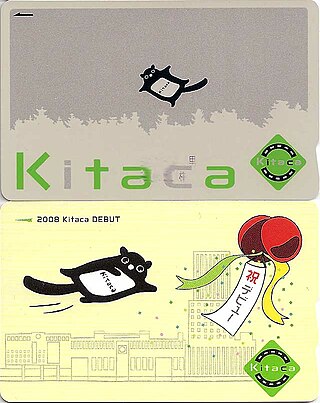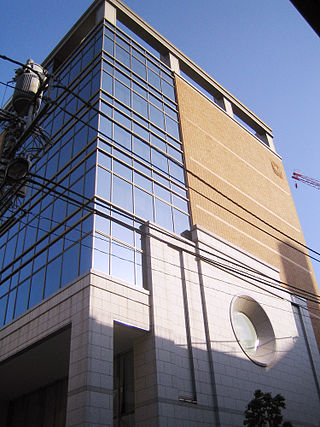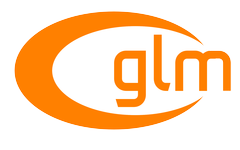
Edy, provided by Rakuten, Inc. in Japan is a prepaid rechargeable contactless smart card. While the name derives from euro, dollar, and yen, it works with yen only.

Edy, provided by Rakuten, Inc. in Japan is a prepaid rechargeable contactless smart card. While the name derives from euro, dollar, and yen, it works with yen only.
Edy was launched on January 18, 2001, by BitWallet, with financing primarily from Sony, in addition to then other companies, including NTT Docomo and the Sumitomo Group. [1]
NTT Docomo's i-mode mobile payment service Osaifu-Keitai, which launched on 10 July 2004, included support for BitWallet's Edy. In 2005, over a million payments had been made with the service. [2]
On 18 April 2006, Intel announced a five billion yen (approx. US$45 million, or 35 million euros as of May 20, 2006) investment in bitWallet, [3] aimed at furthering its usage on computers. [4]
On 1 June 2012, Rakuten acquired Edy, changing the official name to RakutenEdy and the parent company from bitWallet to RakutenEdy Inc. The three-oval blue-tone logo was changed to the Rakuten logo and the font of the word 'Edy' was altered. [5]
Edy can be used on Osaifu-Keitai featured cellphones. Makers of these phones include major cell phone carriers such as docomo, au and SoftBank. The phones can be used physically like an Edy card, and online Edy features can be accessed from the phones as well, such as the ability to charge an Edy account.

Turbolinux was a Japanese Linux distribution targeting Asian users.

NTT Docomo, Inc. is a Japanese mobile phone operator. The name is officially an abbreviation of the phrase, "do communications over the mobile network", and is also from a compound word dokomo, meaning "everywhere" in Japanese. The company is headquartered in Sanno Park Tower, Nagatachō, Chiyoda, Tokyo. Docomo provides phone, video phone, i-mode (internet), and mail services. It is the largest wireless carrier in Japan, with 82.632 million subscribers as of March 2021.
Suica is a prepaid rechargeable contactless smart card, electronic money used as a fare card on train lines in Japan, launched on November 18, 2001. The card can be used interchangeably with JR West's ICOCA in the Kansai region and San'yō region in Okayama, Hiroshima, and Yamaguchi prefectures, and also with JR Central's TOICA, JR Kyushu's SUGOCA, Nishitetsu's Nimoca, and Fukuoka City Subway's Hayakaken area in Fukuoka City and its suburb areas. The card is also increasingly being accepted as a form of electronic money for purchases at stores and kiosks, especially within train stations. As of 2018, JR East reports 69.4 million Suica UID's have been issued, usable at 476,300 point of sale locations, with 6.6 million daily transactions.

Rakuten Group, Inc. is a Japanese technology conglomerate based in Tokyo, founded by Hiroshi Mikitani in 1997. Centered around the online retail marketplace Rakuten Ichiba, its businesses include financial services utilizing fintech, digital content and communications services such as the messaging app Viber, e-book distributor Kobo, and Japan's fourth mobile carrier Rakuten Mobile. Rakuten has more than 28,000 employees worldwide, operating in 30 countries and regions, and its revenues totalling US $12.8 billion as of 2021. Rakuten was the official sponsor of the Spanish football club FC Barcelona from 2017 until 2021, and the Golden State Warriors of the NBA as of 2022. It is often referred to as the "Amazon of Japan".
FeliCa is a contactless RFID smart card system from Sony in Japan, primarily used in electronic money cards. The name stands for Felicity Card. First utilized in the Octopus card system in Hong Kong, the technology is used in a variety of cards also in countries such as Singapore, Japan, Indonesia, Macau, the Philippines and the United States.
Nanaco is a prepaid cash-rechargeable contactless electronic money card used at Seven & I Holdings-owned stores in Japan, which are 7-Eleven convenience stores, Denny's restaurants, and Ito-Yokado merchandise stores. In addition, Nanaco can be used at more than 7,000 stores outside the company's group, especially those that are JCM affiliated shops.

Kitaca is a rechargeable contactless smart card ticketing system for public transport in Sapporo, Japan. Hokkaidō Railway Company introduced the system from October 25 2008. Its name means "the card of north", while 北 is also the first character of Hokkaidō (北海道). Like other electronic fare collection systems in Japan, the card uses RFID technology developed by Sony corporation known as FeliCa. The card has an official mascot of Ezo momonga, a kind of flying squirrel found in Hokkaidō. The mascot is designed by Sora, an illustrator who lives in Sapporo.

Osaifu-Keitai, literally "Wallet Mobile", is the de facto standard mobile payment system in Japan. Osaifu-Keitai services include electronic money, identity card, loyalty card, fare collection of public transits, or credit card. The term "Osaifu-Keitai" itself is a registered trademark of NTT Docomo.

Yodobashi Camera Co., Ltd. is a major Japanese retail chain specializing in electronics, PCs, cameras and photographic equipment.

OSDN is a web-based collaborative development environment for open-source software projects. It provides source code repositories and web hosting services. With features similar to SourceForge, it acts as a centralized location for open-source software developers.

The Japanese mobile phone industry is one of the most advanced in the world. As of March, 2022 there were 199.99 million mobile contracts in Japan according to the Ministry of Internal Affairs and Communications. This is 158 percent of Japan's total population.
NEC Mobile Communications was a mobile phone manufacturer established 1 May 2010. It started as a joint venture among three Japanese electronics manufacturers NEC, Casio and Hitachi, where NEC owned 70.74%, Casio 20.00% and Hitachi 9.26%. At one point, the company was the second largest maker of mobile terminals in Japan. The company headquarters was in Kawasaki, Kanagawa. The company dissolved in March 2016.

Kadokawa Corporation, formerly Kadokawa Dwango Corporation, is a Japanese media conglomerate that was created as a result of the merger of the original Kadokawa Corporation and Dwango Co., Ltd. on October 1, 2014.

GLM Co. Ltd. is a Japanese company headquartered in Fushimi-ku, Kyoto, Japan. Their main businesses include the development and sales of electric vehicles (EVs).

Docomo Anime Store Inc. (株式会社ドコモ・アニメストア) is a Japanese entertainment company owned by NTT Docomo. It operates d-anime Store, a video on demand service specializing in anime.
Rapidus Corporation is a semiconductor manufacturer headquartered in Chiyoda, Tokyo, Japan. Rapidus was established in August 2022 with the support of eight major Japanese companies: Denso, Kioxia, MUFG Bank, NEC, NTT, SoftBank, Sony, and Toyota. The goal of Rapidus is to increase advanced semiconductor manufacturing capacity with a 2 nm process by 2027.

Lemino is a Japanese video on demand over-the-top streaming service operated by NTT Docomo. From its establishment in 2011 until 2022, it was owned 70% by Avex. It operated as a subscription video on demand (SVOD) service under the name d-market Video Store from 2011 to 2013, d-video (dビデオ) from 2013 to 2015, and dTV from 2015 to 2023, before becoming partially an ad-supported video on demand (AVOD) service.
d-anime Store (dアニメストア), previously known simply as Anime Store (アニメストア), is a Japanese subscription video on demand (SVOD) service majority-owned by NTT Docomo, with Kadokawa. It specializes in anime and was launched in July 2012.
Disney Deluxe (ディズニーデラックス) was a Japanese subscription video streaming service owned and opereated by the Walt Disney Japan and NTT Docomo.